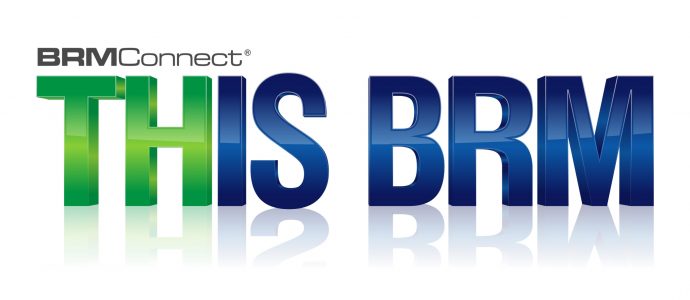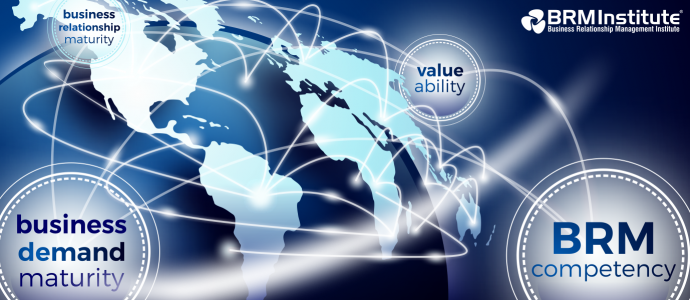BRM Capability
A business relationship management capability is everything it takes, both visible and invisible, to nurture relationships in an organization. Examples of visible components are meetings, artifacts, and professional development, while examples of invisible components are knowledge learned, experience gained, trust, and confidence-building. Used effectively, these components build the endless reserve of energy necessary to evolve culture, build partnerships, drive value, and satisfy purpose.
The business relationship management capability facilitates culture advancement, driving it to one of trust, creativity, innovation, authenticity, and shared ownership across the organization. A mature business relationship management capability converges cross-functional teams to create holistic strategies that deliver organizational value and meaningful results.
Click here to learn more on: BRM Capability Defined | BRM Capability Success
This is BRM.
We are giving you TEN compelling reasons to take the plunge and check out the next BRMConnect Conference October 10-12, 2017 in Washington, D.C. Be sure that you take advantage of the current early bird special (expiring July 12, 2017) to reserve your ticket in the next few days.
6 Business Skills Everybody Needs (Not Just IT)
IT is often seen as though it has unique business skills needed to influence in ways that other groups can’t. Here, Joe Topinka explains why that isn’t the case and outlines the six skills all business professionals should have.
Leverage a BRM Capability to Earn Strategic Partnership
Position your BRM capability for success using these practical cases and examples to earn strategic partnership.
Building a BRM Community of Practice
When organizations don’t have the budget to staff a team of BRMs, an alternative approach is to build a BRM discipline or community of practice, composed of application managers, project managers, and others who already have touchpoints with business.
Leveraging a BRM to Move IT to a Strategic Partner in Healthcare
As healthcare settings become increasingly dependent on emerging technologies, BRMs provide unique value in ways that vendors and consultants simply do not.
Global BRM Trends and Challenges
After conducting the Grab@Pizza simulation with hundreds of organizations, GamingWorks has detailed some key global issues identified in relation to BRM.
The Strategic Importance of BRMs in Financial Services
As a strategic partner, BRMs help financial services leverage technology to meet the challenges faced by the industry. Learn more about how building a formal BRM capability in these spaces can lead to greater value outcomes and business success.
Leveraging Your BRM Capability with ITIL® Service Portfolio Management Process
Within IT, IT Service Management (ITSM) best practices align naturally with a BRM capability, as they focus on processes and techniques that help drive innovation and business value results. Learn more here.
How Business Leaders Can Return Value to the BRM
PowerPoint presentations don’t win IT leaders over—corporate is good at making those. What catches the attention of IT executives are business leaders speaking up for their BRMs.
The Strategic Importance of BRMs in Retail
Retail industry BRMs can add immense value through developing strategy, working cross-functionally, delivering value-add capabilities, and more.
Influencing Without Authority: A Valuable Tool for BRMs
When it comes to informal leadership, Jack Probst of Pink Elephant discusses the three best critical practices for influencing without authority as a BRM.
The Changing Landscape and the Future of Active Listening
As the world becomes increasingly digital, BRMs exist at a critical crossroads of building relationships using traditional F2F methods and utilizing the latest technology and digital updates to engage in active listening and be successful in their role.
M&A Activity Presents an Opportunity for BRMs to Provide Value
Whether you’re a BRM looking to build your relationship with an organization or you are already a strategic partner to business, a merger or acquisition can be the perfect chance to demonstrate value as a business peer.
The Role of BRMs in Transformation
When business partners have to consume services differently, they often have to modify their behavior from the manual way of doing business to automation. The Business Relationship Manager (BRM) plays a critical role in this transformation.
BRMs Ensure Companies Move Faster
While C-suite executives know where they need to go and when they need to get there, it’s up to the BRM to show them the best route.
“From the Seats of the C-Suite Series: Lets Chat BRM” webinar series archive
An archive of a series of one-hour, live, townhall-style interviews with a leading C-Level executives discussing BRMs and the BRM capability.
Why Should a CEO Care About Convergence?
In order to meet demands and deliver services that exceed expectations, CEOs must make business-IT convergence a priority.
F2F vs. Digital Communication: Pros, Cons, and When to Use Each
The ease of digital communication or the personal touch of face-to-face conversations? Learn how to balance the two in today’s interconnected world.





